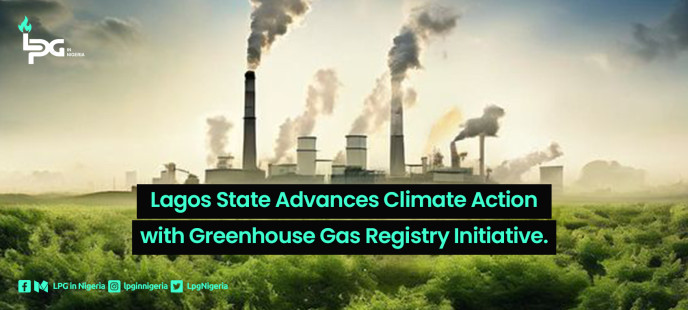- 2883
- 0
Sharing Ideas and Updates on LPG in Nigeria and related information to enable effective collaboration within the LPG Value Chain
Lagos State Advances Climate Action With Greenhouse Gas Registry Initiative

In a continued commitment to reducing greenhouse gas emissions and fostering a sustainable environment, the Lagos State Environmental Protection Agency (LASEPA), in partnership with TPHG Technologies Limited, recently held a Stakeholders’ Engagement event. The event, focused on the implementation of the Lagos Carbon Registry, took place at the State Treasury Resource Centre, Debt Management Office, Alausa, Ikeja.
The Lagos Carbon Registry is a vital initiative aimed at tracking and managing the state's carbon emissions, providing a significant tool in the fight against climate change. In his opening remarks, LASEPA General Manager, Dr. Tunde Ajayi, highlighted that this initiative represents a key step in the state’s climate resilience efforts. "The Lagos Carbon Registry is a crucial tool in our fight against climate change. It will help us track and verify greenhouse gas emissions from various sources, identify reduction opportunities, and promote clean energy solutions," he said.
Represented by Mrs. Adedayo Adebayo, Director of Environmental Sustainability (E-Waste & Plastic Solutions), Dr. Ajayi emphasized the registry’s role in enabling stakeholders to self-audit their emissions, contributing to a reduced carbon footprint for Lagos State.
The registry, which operates through an online platform, will allow businesses and organizations to report and track their emissions, demonstrating a collective commitment to environmental sustainability. It’s a step that aligns with global best practices in climate change mitigation and the promotion of sustainable energy practices.
The Special Adviser to Governor Babajide Sanwo-Olu on the Environment, Mr. Olakunle Rotimi Akodu, echoed this sentiment, underscoring the state’s dedication to climate action. He emphasized that Lagos State has consistently prioritized climate initiatives through various summits and programs aimed at building a more resilient future.
Representing Mr. Akodu, Deputy Director and Head of Climate Change in the Ministry of Environment and Water Resources, Mr. Bankole Omoniyi, reiterated the importance of the ministry’s emissions inventory efforts in tackling climate change.
The event also featured contributions from Mrs. Ayodele Osho, Head of Air Quality & Emissions Control at LASEPA, who pointed out that the launch of the Lagos Carbon Registry is a significant milestone. She noted the registry’s potential to reduce the state’s overall carbon footprint, enhance energy efficiency, and safeguard natural carbon sinks, which are crucial in managing emissions.
Lead Consultant from TPHG Technologies Limited, Mofoluso Fagbeja, introduced the participants to the broader benefits of the registry, highlighting its positive impact on public health and the environment.
The Stakeholders’ Engagement was well-attended by key government officials from various ministries, departments, and agencies, alongside representatives from the private sector, all showing support for this groundbreaking environmental initiative. This effort marks a progressive step forward for Lagos State, positioning it as a leader in the nation’s drive towards sustainability and climate resilience.
We at LPG in Nigeria find that the implementation of the Lagos Carbon Registry has several key implications for Lagos State, its stakeholders, and the environment:
1. Enhanced Carbon Management: The registry will provide a structured way to track and manage greenhouse gas emissions from various sectors across the state. This can help Lagos decide where to focus its efforts to reduce emissions and meet global climate goals.
2. Promotion of Clean Energy Solutions: With the ability to track emissions more accurately, the state can better promote and incentivize clean energy alternatives. This would encourage businesses and individuals to adopt more sustainable practices, such as using renewable energy sources or improving energy efficiency.
3. Boost to Environmental Sustainability: By focusing on reducing carbon footprints, Lagos can mitigate some of the environmental challenges it faces, including air pollution, extreme weather, and rising temperatures caused by climate change.
4. Private Sector Accountability: The registry will likely push businesses to become more transparent about their emissions, encouraging them to self-audit and regulate their environmental impact. This could lead to new environmental compliance requirements, especially for industries with high emissions.
5. Support for Climate Policy: The initiative strengthens Lagos State’s alignment with global climate change initiatives and policies, positioning it as a model for other regions in Nigeria and Africa. The data collected from the registry can inform climate policy at both the state and national levels.
6. Economic and Social Benefits: In the long term, the registry can help attract investments in green technologies and industries, which could create jobs in the clean energy and environmental sectors. Additionally, improvements in air quality and environmental health could lead to better public health outcomes.
7. International Recognition and Collaboration: Lagos State could gain recognition on the global stage as a leader in climate action. This could open doors for international collaborations, funding, and support for further environmental projects.
















0 Comment.